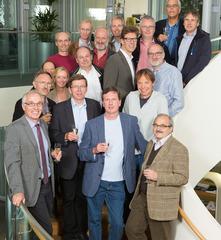URL: https://www.desy.de/news/news_search/index_eng.html
Breadcrumb Navigation
DESY News: Free-Electron Laser prize for DESY pioneers
News
News from the DESY research centre
Free-Electron Laser prize for DESY pioneers
This year’s FEL Prize has been awarded to the two DESY researchers Mikhail Yurkov and Evgeny Schneidmiller at the Free-Electron Laser Conference in South Korea for their pioneering work in developing and improving free-electron lasers (FELs). The award recognises outstanding contributions to the study and development of this key future-oriented technology.

Mikhail Yurkov and Evgeny Schneidmiller with the Director of DESY's Accelerator Division, Reinhard Brinkmann, and the Chairman of the DESY Board of Directors, Helmut Dosch (first row, from right to left). Credit: DESY
Right from the start, Yurkov and Schneidmiller were instrumental in designing the free-electron laser at DESY’s TESLA Test Facility, which gave rise to FLASH in 2005. They also made key contributions towards improving the performance of FLASH. At the European XFEL, they are very strongly involved in calculating and optimising the FEL processes (Mikhail Yurkov is leading the work package on FEL concepts). “I would like to offer the prize-winners my heartiest congratulations,” said Reinhard Brinkmann, the director of DESY’s accelerator division. “Both of them have developed many excellent new ideas and concepts for free-electron lasers in numerous papers, and are held in high esteem by the scientific community.”
This is already the second time that the award has gone to Hamburg: in 2006, the FEL Prize was awarded to Jörg Roßbach of the University of Hamburg and DESY’s Evgeny Saldin.



